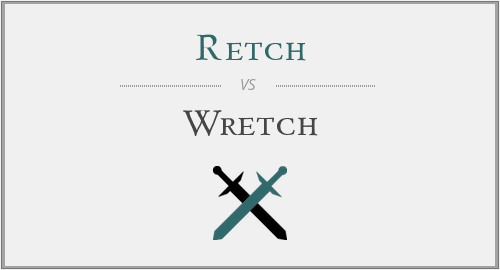The English language doesn’t seem to be lacking in synonyms for the verb “vomit.” We have “upchuck,” “puke,” “hurl,” “heave,” and “retch,” to name a few. So do we really need to add another one, even if only as an alternate spelling of an established synonym for vomiting? Because that is how wretch is sometimes perceived, as nothing more than a different way to spell retch. After all, they’re spelled almost the same, and they’re pronounced the same. But they’re not the same, not really. They don’t even have the same root. Wretch isn’t even a verb, so the very common misspelling of retching as wretching doesn’t really make any sense because wretching is not a word.
Want to know more about wretch and retch? Keep reading.
Origin:
Retch originated in mid-19th century: variant of dialect reach, from a Germanic base meaning ‘spittle’. Wretch originated from Old English wrecca (also in the sense ‘banished person’), of West Germanic origin; related to German Recke ‘warrior, hero’, also to the verb wreak.
Retch as verb:
Retch is used as a verb in English language where it means to make the sound and movement of vomiting.
The sour taste in her mouth made her retch.
The action of vomiting or throwing up is referred as retch.
He retched up a thin stream of vomit.
Wretch as noun:
Wretch is used as a noun in English language where it implies the meaning of an unfortunate or unhappy person. It has synonyms like poor creature, poor soul, poor thing, miserable creature, sad case or unfortunate.
Can the poor wretch's corpse tell us anything?

A despicable or contemptible person is called a wretch.
Ungrateful wretches are all over this place.
Examples:
The sight of the government now having to back Andrew, as he is “unsackable”, makes one want to retch. [Guardian]
The rocking of the deck beneath his feet made his stomach heave, and the wretched food tasted even worse when retched back up. [A Dance with Dragons, George R. R. Martin]
Even the hint of fish sauce or anchovy paste causes instant retching and gagging. [Huffington Post]
Field thought it was appropriate to get a bloke to paint the house in return for sorting out the poor wretch’s immigration status. [New Zealand Herald]
Unless he was royalty, which all too plainly he was not, my mother would have berated or possibly beaten this poor wretch. [Martin’s Absolution, M. Clement Hall]
I gathered, from the opened food containers and dry water bottles, that the poor wretches must have been trapped there for some time [Daily Beast]
Retch or wretch:
A wretch is an unhappy or unfortunate person, especially one in the depths of misery of some sort. The word has several senses extending from this one; it sometimes refers to a person who is despicable or contemptible but not necessarily unfortunate, and it’s sometimes used for animals. It’s also the source of the adjective wretched, meaning miserable, unfortunate, or (describing nonhuman things) very bad. To retch is to vomit or to clear the throat by coughing or hawking. The word is primarily a verb, but it also works as a noun for the act of retching. The two words are unrelated and have never been variants of each other, but, as is often the case with pairs of homophones that are both somewhat rare, retch and wretch are commonly mixed up. That spell check has nothing to say about phrases like “I wretched up my dinner” and “he is a retched creature” also doesn’t help.








Have a discussion about this article with the community:
Report Comment
We're doing our best to make sure our content is useful, accurate and safe.
If by any chance you spot an inappropriate comment while navigating through our website please use this form to let us know, and we'll take care of it shortly.
Attachment
You need to be logged in to favorite.
Log In